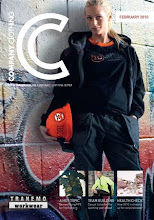Friday, 29 January 2010
Tesco: a little decorum helps
Staff at a store in St Mellons in Cardiff have taken action after receiving complaints from a number of customers regarding the chosen attire of a few members of the public.
Management decided to display signs in shop window that read: “To avoid causing offence or embarrassment to others we ask that our customers are appropriately dressed when visiting our store (footwear must be worn at all times and no nightwear is permitted)."
But not everyone agrees with the new rules. 24 year-old mother of two, Elaine Carmody, was refused entry to the store whilst wearing her “best pair” to purchase a packet of cigarettes. She said: "If you're allowed to wear jogging bottoms, why aren't you allowed to wear pyjamas in there, that's what I don't understand?
"I think it's stupid really not being allowed in the supermarket with pyjamas on.
"It's not as if they're going to fall down or anything like that. They should be happy because you're going to spend all that money."
It remains to be seen if the policy will be introduced to other stores.
Wednesday, 27 January 2010
Does your wardrobe change with the economic climate?
At a time when retailers of all types are struggling to stay afloat, it may surprise you to hear that shirt specialists and other workwear chains are experiencing rising sales.
With more competition than ever for jobs, it seems that employees are looking to project a highly professional image by spending their money carefully and selecting classic pieces that will not date. In fact, a survey by the Aziz Corporation showed that almost half of employees would dress smarter if their job was under threat.
Jane Dawson of online boutique Business Wardrobe explains: “Economic uncertainty is set to continue in 2010 and researchers have predicted a rise in sales of smart business wear. Dress-down Fridays have been replaced by female employees dressing to impress, as the threat of redundancy becomes evermore real. For online retailers specialising in formal officewear this is great news.
“Both the employed and unemployed want to have a more professional image to help them either retain or gain a job. This has created a work culture that is driven by both fashion trends and the need to stand out in a competitive job market.”
Thursday, 21 January 2010
What not to wear in the office
Bespoke corporatewear supplier NKD Clothing has published a list of workwear faux pas that may leave some of you quaking in your all-too-casual Ugg boots….
- First up, cleavage and short skirts are a big no-no. Though they may attract a lot of attention, it is almost always for the wrong reasons. Likewise, keep your towering stilettos, lacy camisoles and fishnet tights for the weekend.
- At the other end of the scale, jeans, Ugg boots and that woolly jumper your grandma knitted you for Christmas may well be a little too casual for the workplace. The same applies to flip-flops and trainers, or anything that would not look out of place in a gym.
- Finally, clothes should always be clean and ironed and complemented with tasteful jewellery and neat hair. Over-the-top makeup should be avoided at all costs, as well as anything too outrageous or trendy.
But how seriously should we take these rules? A quick look around the office and I’ve already seen at least 8 violations of the NKD guidelines, but does that make us any less professional? I’d like to think not. In companies where there is little face-to-face contact with clients, comfort may well take precedence over formality. With such diversity in the expectations of individual workplaces, I would suggest that perhaps the only rules we should be following are those listed in the company dress code.
Wednesday, 13 January 2010
Tesco doubles its commitment to Fairtrade uniforms
Their ‘Wear Fair’ campaign, which aims to see all UK pupils kitted out in Fairtrade cotton uniforms by 2015, has gained momentum after Tesco agreed to increase its Fairtrade lines by 50% in the next two years. As a result, Tesco will become the UK’s leading provider of Fairtrade cotton school uniforms, overtaking rival Marks & Spencer.
According to research commissioned by People & Planet, nearly 70% of pupils as well as many parents would like uniforms to be made from Fairtrade cotton, particularly at a time when cotton producers are facing severe financial hardship.
Anna Heywood, a mother of two from Newcastle said: "I want to ensure that no one has been exploited in making my children's school uniform but like most parents I haven't got the time or knowledge to start investigating the supply chain of my daughter's school jumper or all the different ethical schemes that the High street stores and supermarkets claim to sign up to. The Fairtrade label is the only guarantee that can instantly assure me that the producers are being treated fairly."
People & Planet now hope that other major retailers will follow suit.



